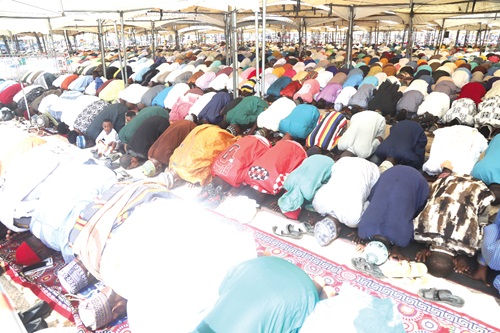Hajj cost relief on the way: President assures of drop in fares – Plans to make Eid-ul-Fitr public holiday – Nsemkeka
The government has promised policy interventions to better the spiritual, educational and economic welfare of the Muslim community.
President John Dramani Mahama pledged the interventions and said the government was committed to the welfare of Muslims as well as other groups of people in the larger population.
Foremost, he expressed concern over the high cost of performing Hajj and said that the government was working closely with authorities in Saudi Arabia and other relevant agencies to reduce the cost significantly.
Addressing Muslim faithful at the Black Star Square in Accra yesterday to commemorate Eid-ul-Adha, President Mahama was optimistic that by next year, the fare would see a notable drop, especially if the economy continued on its recovery path.
As part of broader reforms, the President also revealed that a bill to make Eid-ul-Fitr a statutory public holiday had been drafted and would soon be laid before Parliament.
That, he explained, would formally recognise the religious importance of the celebration and end the current reliance on Executive Instruments to grant such holidays.
“It means that it will be a law and no longer be by Executive Instruments. This move recognises the profound spiritual importance of the festival of Eid-ul-Fitr in Muslim life,” President Mahama said.
Eid-ul-Adha
Eid-ul-Adha, also known as the Festival of Sacrifice, is one of the two major Islamic festivals celebrated by Muslims around the world, the other being Eid-ul-Fitr.
It falls on the 10th day of Dhu al-Hijjah, the final month of the Islamic lunar calendar, and coincides with the completion of the annual Hajj pilgrimage to Mecca, which is one of the five pillars of Islam.
The festival commemorates the profound act of faith shown by Prophet Ibrahim, who was willing to sacrifice his beloved son, Ismail (Ishmael), in obedience to God’s command.
Just as he was about to carry out the sacrifice, Allah provided a ram as a substitute, sparing Ismail’s life.
This story symbolises unwavering faith, obedience and submission to God’s will.
To honour this event, Muslims who can afford, sacrifice an animal —typically a sheep, goat, cow or camel — and the meat is divided into three parts: one-third for the family, one-third for friends and relatives, and one-third for the poor and needy.
This act reinforces the values of charity, community and compassion.
Eid-ul-Adha is marked by prayers, sermons and gatherings, as well as the sharing of food and goodwill.
It is a time of reflection, gratitude, and strengthening of ties within families and communities.
Willingness
The President acknowledged the deep religious significance of Eid-ul-Adha, describing it as a celebration of faith, obedience, sacrifice and compassion.
He said the story of Prophet Ibrahim’s willingness to sacrifice his son in obedience to Allah offered timeless lessons about submission, sacrifice and trust in God.
President Mahama urged Ghanaians, particularly Muslims, to show compassion and support those in need, noting that Eid was not only about the physical act of sacrifice, but also about sharing, kindness and social responsibility.
Education
On the educational front, President Mahama disclosed that he had directed the Minister of Education to begin engagement with the Islamic Education Unit to enhance its operations, including the recruitment and training of qualified Arabic instructors.
The President emphasised that Arabic education must no longer be marginalised and, therefore, pledged that work would soon resume on abandoned infrastructural projects at the Al-Faruq College of Education.
In addition, the President announced the development of a dedicated scholarship support programme under the Scholarships Secretariat to help Muslim students to pursue advanced degrees in key fields such as medicine, law, information and communications technology, engineering and the social sciences.
Zango development framework
President Mahama further highlighted a new Zango Development Framework, which he said, would prioritise infrastructure, health care, sanitation, sports and vocational training in Zango communities.
He called on the youth in Zangos and inner cities to take advantage of new programmes such as the National Apprenticeship Programme and the Adwumawura Entrepreneurship initiative, which provided both skills training and capital support.
President Mahama emphasised that those initiatives were not just about providing jobs, but restoring dignity, independence and leadership among young people.
National unity
The National Chief Imam, Sheikh Osman Nuhu Sharubutu, in a speech read on his behalf by his spokesperson, Sheikh Aremiyao Shaibu, offered his support to President Mahama’s efforts to reset the country.
He underscored the need for national unity, urging all Ghanaians, regardless of political, religious or ethnic affiliation, to rally behind the President as he works to leave behind a legacy of transformation and justice.
The Chief Imam emphasised values such as sacrifice, sincerity, compassion and genuine devotion to nation-building as essential virtues that had held civilisation together across generations.
Sheikh Sharubutu also welcomed the planned July 1 National Day of Prayer and Thanksgiving, describing it as an opportunity to promote social cohesion and peace.
He expressed hope that the occasion would unite the country in a shared vision for prosperity and spiritual renewal.

